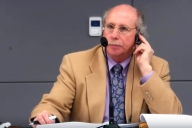You have /5 articles left.
Sign up for a free account or log in.
When presidents become unpopular, a "Dump (fill in the blank)" Facebook page is a standard part of seeking a change.
But at Babson College, some idealistic young alumni (joined by hundreds of students) are using Facebook and Twitter to try to get a search committee to pick their favorite administrator as the institution's next president. In just a few days, more than 1,800 alumni and students have joined the Facebook campaign (a figure that is impressive, given that Babson enrolls about 2,000 undergraduates). A Twitter campaign has been started as well.
The object of all of this affection? Dennis Hanno, who is currently dean of the graduate school and vice provost at Babson, but who is beloved in part because of his previous position as associate dean for undergraduate matters. The organizers of the campaign stress that Hanno didn't ask them to start their effort and has nothing to do with the campaign.
The explanation of the campaign on Facebook says: "First, he revolutionized the undergraduate experience. Then, he took the graduate school to the next level. It's our responsibility to ensure he is enabled and empowered to continue defining Babson's future. Tell the presidential search committee your Dean Hanno story. Everyone has one. Take five minutes. Then share this photo and tell your friends. The man. The legend. #PrezHANNO"
David Yarus, a 2008 graduate who works for a social media agency in New York, said that Hanno arrived at Babson when Yarus was a junior, and that the campus atmosphere for students changed overnight. "He totally broke down the barriers between students and the administration," said Yarus, who was student body president at Babson. "I had no idea what a dean was," but after Hanno arrived, the two spoke all the time.
Marissa Ferber, a 2009 graduate who works for a Massachusetts nonprofit, joined with Yarus to begin the campaign. She described a disconnected campus feel before Hanno arrived. "He would do things like order 100 pizzas and bring them someplace on campus at midnight and tell everyone to come there." Suddenly, the campus had spirit and a sense of community, she said. (Hanno appears to be a firm believer in the value students place on free food -- a recent tweet of his: "Rumor has it that the bagel fairy made a Café Fresh delivery to Mandel and Pietz. Check the lounges!" Hashtag: Babsonlove.)
Ferber liked to organize events, she said, so Hanno helped her learn how to organize national events involving college students from all over the country, and provided the money to pull off such events.
Via e-mail Tuesday night, Hanno said that he was "very honored to see that the many alums and friends of the college I have connected with during my time at Babson think I would be a good candidate for the position," and he also said that it was "most heartening to see the huge number of alums interested in the outcome of this process." But he also said that he has had no role in the campaign, and he didn't make claims on uniquely being able to take on the job.
"The search committee is in the very early stages of the search process, but I'm certain that their intention is to seek the most highly qualified candidate and not the most popular one," he said.
Judging from the many comments Facebook and Twitter, Hanno has connected with lots and lots of students. But how many presidents are selected these days because students love them? What about fund-raising and balancing budgets, etc.? Babson appears to be running a traditional search, with a committee, an executive search firm (Korn/Ferry), and the like. (Len Schlesinger, the current president, is stepping down.)
Susan Resneck Pierce, an Inside HIgher Ed columnist who was formerly a search consultant, said via e-mail that she has never before seen social media used in this way in a search. She said she was pleased to see the "energy and passion" of young alumni and students working on behalf of "someone who has clearly earned their trust and respect."
She added that "this is a great example of how we are living in a very different world where colleges (and for that matter all organizations) can no longer 'control the message.'"
But can such a campaign work? Why do the organizers of PrezHANNO think that the qualities they value so much will influence the search committee?
Yarus noted that Babson is a business-oriented college, proud of its entrepreneurial students and programs. "Sure an executive search firm typically does what it does in these situations," he said. "But Babson is about innovation, about the future, about new ways of doing things. I suggest that [students and young alumni] could and should be able to recruit a president."
Ferber said that many colleges nationally are worried about keeping young alumni engaged (and donating) while Babson's young alumni are pledging to donate if Hanno gets the job. "If anyone is going to get young alumni to donate, it's Dean Hanno," she said.
Yarus said that some people at the college -- people older than he and Ferber and those signing on to their campaign -- have suggested that they have made their point and they should shut down their online activities. "They say we should let nature take its course," he said. "But we have no intention of stopping. We want people to be part of this process."
By keeping the campaign going, he said, he and his fellow alumni will pose a question. Why, Yarus asked, shouldn't a search committee favor as president someone who is passionate about the college and exceptional at connecting with its students?








